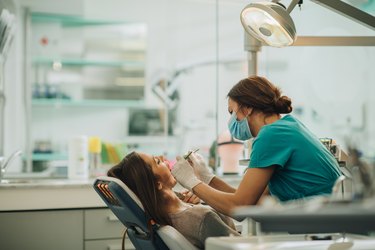
When it comes to mask annoyances, you probably never thought stink-to-high-heaven breath would be on the top of your list. But more than 80 million people have chronic halitosis, according to the Academy of General Dentistry, a condition you may not normally be able to sniff out on your own.
"Masks that cover the mouth and nose create a closed or contained air pocket, which collects our breath and reintroduces any odors back into the nose," explains Gregory Levitin, MD, an otolaryngologist at New York Eye and Ear Infirmary of Mount Sinai in New York City.
Video of the Day
Video of the Day
Not to mention, if you've previously only had mild bad breath, chronic mask wearing can make it worse.
Get tips on how to stay healthy, safe and sane during the novel coronavirus pandemic.
"When you wear a mask, you tend to breathe through your mouth instead of your nose," says Paul Koshgerian, DMD, MD, an oral surgeon and dentist at Oral Surgery & Dental Implant Specialists of San Diego. "That can lead to a decrease in saliva production, and saliva helps to maintain a healthy balance in our mouths, cleaning our teeth and helping fight bad bacteria. When that balance is disrupted, it can result in bad breath."
Here's how to handle your halitosis.
1. Stay on Top of Your Teeth
Thanks to social distancing and work from home, many of us have put personal hygiene on the back burner. But if you're not taking care of your pearly whites, it encourages the growth of the bad breath-causing bacteria that naturally live in your mouth, Dr. Koshgerian says.
Brush twice a day with a fluoride-containing toothpaste and clean between your teeth daily with floss. Brush your tongue, too, to remove bacteria that contributes to stinky odors, including the back of the tongue, where most of these bacteria are found.
Over-the-counter mouthwashes can help, too, but look for ones that actually contain an antibacterial ingredient like cetylpyridinium chloride, such as Crest Pro-Health Multi-Protection or Colgate Total Pro-Shield.
2. Check Your Diet
Foods such as garlic and onions can cause foul breath because, even once they're digested, the chemicals that cause their odor are absorbed into your bloodstream and from there into your lungs, where they are exhaled, according to the American Dental Association.
High-protein diets are also associated with bad breath, since they force you into ketosis, a condition where your body begins to burn fat cells for energy. This creates waste products called ketones, which your body gets rid of through your urine and breath.
3. Deal With Dry Mouth

It's important to stay well-hydrated, since that can help keep your mouth moist and avoid an overgrowth of bacteria, says Dr. Levitin. While there's no magic number, try to always keep either water or sugarless drinks on hand that you can sip frequently, and don't overdo it on the caffeine, which also can dry out your mouth, according to the American Dental Association.
It's also a good idea to chew sugar-free gum or suck sugar-free hard candies to stimulate the flow of saliva, adds Dr. Koshgerian.
You can also try a mouthwash geared to dry mouth, such as Biotene Dry Mouth Oral Rinse or ACT Total Care Dry Mouth Mouthwash. Look for one that contains xylitol, which has been shown to help improve dry mouth and actually inhibits the growth of bacteria known to cause tooth decay, according to The American Academy of Oral Medicine.
4. Wash Your Mask Frequently
When you wear a mask, respiratory particles from your breath land on it and can eventually cause an icky odor.
Just like any other piece of clothing, cotton masks should be cleaned regularly, says Dr. Levitin. Ideally, you want to wash your mask every day. You can throw it in with your regular laundry, or, if you're washing by hand, soak your cloth mask in bleach for five minutes and then rinse thoroughly with water.
5. Address Your Allergies
People with seasonal allergies are significantly more likely to have bad breath than those without them, according to a September 2016 study published in the journal European Annals of Otorhinolaryngology, Head and Neck Diseases.
This is because post-nasal drip — the movement of mucus from the sinus cavities down the back of the throat — can cause bad breath by providing a food source for bacteria, says Dr. Levitin.
You can help guard against this by frequently using a saline nasal rinse, which clears your nasal passages of any excess gunk, as well as other medicines to help get your allergies under control, such as steroid nasal sprays and antihistamines.
6. See Your Dentist

Up to 80 percent of people with gum disease also have bad breath, according to an October 2015 study published in the Journal of the International Society of Preventive and Community Dentistry.
"The same bacteria on your teeth and gums that is causing bad breath also causes gum disease and tooth decay," explains Dr. Koshgerian.
If it's left untreated, your gums will eventually pull away from your teeth, leaving deep pockets that can fill with odor-causing bacteria. You may need more frequent cleanings (for example, every three to four months instead of every six months) to remove these stinky bugs.
Related Reading
7. Rule Out Any Other Underlying Medical Conditions
If you've seen your dentist and are religious about brushing and flossing every day, your bad breath could be the result of another problem, such as sinusitis, gastric reflux or diabetes, says Dr. Koshgerian.
One common cause is tonsil stones, when food or other debris get caught in the crevices of your tonsils and harden and calcify. Brushing your teeth and tongue thoroughly and gargling with salt water after eating can help, but if they persist, it may be a sign that you need a tonsillectomy.
Concerned About COVID-19?
Read more stories to help you navigate the novel coronavirus pandemic:
- Academy of General Dentistry: What is Halitosis?
- American Dental Association: Bad Breath
- American Dental Association: Xerostomia (dry mouth)
- American Academy of Oral Medicine: Dry Mouth
- European Annals of Otorhinolaryngology, Head and Neck Diseases: Evaluation of halitosis using OralChroma™ in patients with allergic rhinitis
- Journal of International Society of Preventive and Community Dentistry: Determining the association between oral malodor and periodontal disease: A case control study
Is this an emergency? If you are experiencing serious medical symptoms, please see the National Library of Medicine’s list of signs you need emergency medical attention or call 911.